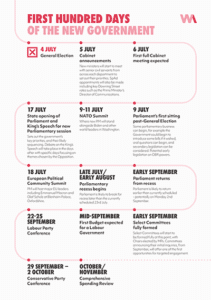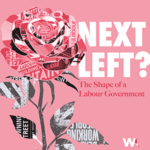The days after a Labour General Election win will see wide-ranging change in SW1, as well as the country.
A selection of immediately deliverable policy changes are almost certain,100+ Ministers will meet their private office teams, set priorities and seek out profile-raising opportunities, and potentially 200+ brand new MPs will pick up their parliamentary pass for the first time and navigate the corridors of power.
Crucial moments abound – from the day after the election, and as MPs and Ministers take up their positions over the next week, to key parliamentary moments throughout the subsequent 2-3 months:
First 100 days of the new government
First 10 days
Ministerial Appointments
More than 100 new Ministers will pick up their red boxes, and meet with senior civil servants from across each department to set out their priorities.
Special Adviser appointments will also be made quickly, including key Downing Street roles such as the Prime Minister’s Director of Communications.
On page 68 of our Next Left guide, Natasha Egan-Sjodin, former Head of Ministerial Briefing at the Department for Business, Energy and Industrial Strategy, explores in detail the briefing of a brand new minister.
Electing a Commons Speaker and Swearing-in of MPs and Peers
First 30 days
King’s Speech
This will set out the government’s key priorities, and also their likely sequencing.
- Not every policy will require a place in the King’s Speech: many could be introduced as part of a subsequent Budget (for example introducing VAT on private school fees), or through existing legislation or statutory instruments.
- Debate on the King’s Speech will take place in the days after – with specific days often focusing on certain themes selected by the Opposition.
- Some parliamentary business can begin before the King’s Speech – for example the government could begin to introduce some bills if it wished, oral questions can begin, and secondary legislation can be considered.
In the scenario of a minority government or confidence-and-supply arrangement, it will be the first test of Labour’s ability to command the confidence of the Commons.
Select Committees
Key Select Committees – such as the Treasury and Public Account Committees – will typically be formed within three to four weeks of Parliament reconvening after the election, with Chairs being elected by MPs. Committees announcing their first inquiries will offer one of the first opportunities for targeted engagement.
First 100 days
Emergency Budget
The Chancellor of the Exchequer will start to set out the new government’s economic strategy, public finance measures, and taxation policies, most likely when Parliament returns in September.
Comprehensive Spending Review
The most recent spending review in Autumn 2021 set departmental budgets up to the end of March 2025. This may lead to two possible outcomes – a one-year CSR from the current government which Labour will adopt, or Labour being compelled to roll-over departmental budgets for a year to give them breathing space to conduct a full multi-year CSR from 2026.
Machinery of Government changes
Labour’s Five Missions typically bring together policy objectives that would span multiple government departments – so a Labour administration, and Sue Gray in particular, will be looking at how central government is structured, to ensure deliverability and accountability around these key priorities.
This might mean changes to government departments, but broader use of Cabinet Committees, cross-departmental teams, the appointment of external ‘czars’, and greater use of taskforces could also be options.
All-Party Parliamentary Groups
APPGs will reform in a less formal way – with changes to groups, and the speed of formations depending on the number of existing MPs returning to Westminster, and the range of interests across the new Parliament.
NEXT LEFT? THE SHAPE OF A LABOUR GOVERNMENT
This article is part of our Next Left series, which examines the people and policies that will shape the next government if Labour wins power – explore the guide in full here.

